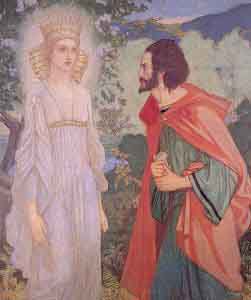Wednesday, March 26, 2008
love
Mr. Foolish

Sunday, March 16, 2008
Bibliography Progress Post
Dirty Billy
"By my troth, i would not underake her in this company." 1.3 line 55
"It's dry, sir." 1.3 line 69
"And I hope to see a housewife take thee between he rlegs and spin it off." 1.3 Lines 96-98
"And I think I have the back-trick simply as strong as any man in Illyria." 1.3-115
"And all is semblative a woman's part." 1.4 - 34
"Many a good hanging prevents a bad marriage." 1.5-18
"Send for money knight. If though hast her not i'th' end, call me cut." 2.3 - 175
"These be her very c's, her u's, and her t's, and thus makes she her great P's." 2.5 -83-85
Above are a strain of quotes taken from the first and second acts of Twelfth Night. As you can see William Shakespeare appears to have quite a knack for sarcastic sexual innuendos. Mr. Shakespeare is usually referred to as one of the best poets and playwrites, ever. It also gives one something to think about when discussing the role of stage plays in Renaissance England. They were thought unnecessary and some critics even said that they were subhuman activities. To a certain extent one would have to agree that the above languanged used by Shakespeare a.k.a Dirty Billy is quite repulsive. Surely a civilized human being would not want to delve out their hard earned money to listen to such defilements of the spoken language.
It's nice to see that Shakespeare's work carries on today not only in adaptations (Twelfth Night is She's the Man starring Amanda Bynes,) but also in the aspect that people only became more perverted not only in writing but in living. Perhaps if this perversion had been dealt with when Billy did it we wouldn't have the likes of Howard Stern and others disgracing the language of civilized beings.
Ebert, Roeper and Henry VIII

Monday, March 3, 2008
T. Hurt
Force and deceit are all that you know.
I struggle to find defilement’s cure.
Refusing to allow this pain to grow.
Until then I stand here, intentions pure.
Although the dearest dove may want a snake--
“Be gone!” I keen. “Banishèd you shall be!”
Linger no more, fore you are a mistake!
Love’s disease duns that I never be free.
Moribund without you and your kind eyes --
But, of course, these are hidden from the world.
Only noticing your ignoble lies,
Treachery, and the men you have hurled.
My deepest wish is for you to become
A virtuous man so we may be one.
The Faerie Queen of the Rings




2). What kind of enemies did they face?
Was there an evil sorcerer? Faeries: Archimago Lords: Sauramon
Did they face error? Faeries: Error itself Lords: Error in Frodo putting on the ring at the Hotel . . . uh oh!
Did they face some sins? Faeries: All 7 of them Lords: Envy- those who wanted the ring; Lust - Aragon and Eowyn;
Greed - Gollum; Wrath- Mines of Moria; Gluttony - Minas Tithes;
Pride - Frodo refusing to have help; Sloth - Sauramon
Did they face Despair? Faeries: By the same name Lords: Frodo, Gollum, Faramir . . . always so sad - - Arwen.
Was there perhaps something two faced? Faeries: Duessa Lords: Gollum/Smeagle
A big meany at the end? Faeries: Dragon Lords: Sauron
3). What about the characters?
Let's do a bit of comparing shall we . .
Description: The Faerie Queen and The Lord of the Rings
Knight: Red Crosse Aragon
Lovely Lady: Una Arwen
Warrior Woman: Britomart Eowyn
Evil Sorcerer: Archimago Sauramon
Companion: Dwarf Gimli (who is also a dwarf)
Two-Faced: Duessa Gollum/ Smeagle
Nature Help: Lion / Talking Tree Horse/ Talking Tree
Good Wizard: Merlin Gandalf
Christ Figure: King Arthur Elron
4). What about everything else?
Ultimate Goal:
Faeries: save the castle from the fiery dragon
Lords: save the ring from the evil fiery eye
Language:
Faeries: purposely archain, but used influence from Greek and Roman poets
Lords: influenced by old English, Norse mythology, and christian ideals
Formation:
Faeries: written in a series of books with many cantos and in those many stanzas
Lords: three different volumes meant to represent three different eons, and in those volumes are a variety of books
